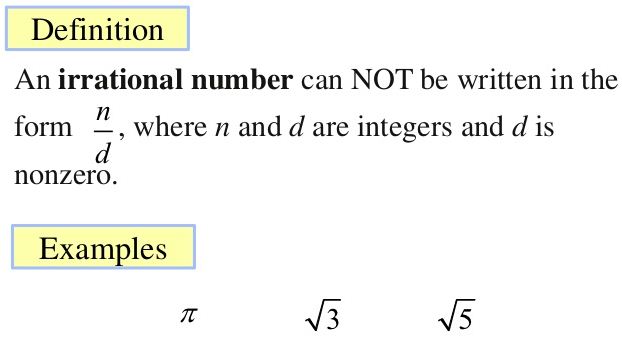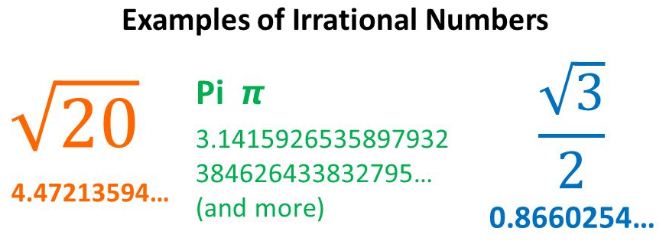What Is Irrational Number
- A number is irrational if and only if its decimal representation is non-terminating and non-repeating. e.g.√2, √3, π ……………. etc.


- Rational number and irrational number taken together form the set of real numbers.
- If a and b are two real numbers, then either
(i) a > b or (ii) a = b or (iii) a < b - Negative of an irrational number is an irrational number.
- The sum of a rational number with an irrational number is always irrational.
- The product of a non-zero rational number with an irrational number is always an irrational number.
- The sum of two irrational numbers is not always an irrational number.
- The product of two irrational numbers is not always an irrational number.
- In division for all rationals of the form \(\frac { p }{ q } \)(q ≠ 0), p & q are integers, two things can happen either the remainder becomes zero or never becomes zero.
Type (1) Example: \(\frac { 7 }{ 8 } \) = 0.875

This decimal expansion 0.875 is called terminating.
∴ If remainder is zero then decimal expansion ends (terminates) after finite number of steps. These decimal expansion of such numbers terminating.
Type (2) Example: \(\frac { 1 }{ 3 } \) = 0.333……… = \(0 . \overline{3}\)

or \(\frac { 1 }{ 7 } \) = 0.142857142857….. = \(0 . \overline{142857}\)

In both examples remainder is never becomes zero so the decimal expansion is never ends after some or infinite steps of division. These type of decimal expansions are called non terminating.
In above examples, after Ist step & 6 steps of division (respectively) we get remainder equal to dividend so decimal expansion is repeating (recurring).
So these are called non terminating recurring decimal expansions.
Both the above types (1 & 2) are rational numbers.
Types (3) Example: The decimal expansion 0.327172398……is not ends any where, also there is no arrangement of digits (not repeating) so these are called non terminating not recurring. These numbers are called irrational numbers.
Example:
0.1279312793 rational terminating
0.1279312793…. rational non terminating
or \(0 . \overline{12793}\) recurring
0.32777 rational terminating
or \(0 . 32\overline{7}\) rational non terminating
0.32777……. & recurring
0.5361279 rational terminating
0.3712854043…. irrational non terminating non recurring
0.10100100010000 rational terminating
0.10100100010000…. irrational non terminating non recurring.
Irrational Number Example Problems With Solutions
Example 1: Insert a rational and an irrational number between 2 and 3.
Sol. If a and b are two positive rational numbers such that ab is not a perfect square of a rational number, then \(\sqrt { ab } \) is an irrational number lying between a and b. Also, if a,b are rational numbers, then \(\frac { a+b }{ 2 } \) is a rational number between them.
∴ A rational number between 2 and 3 is
\(\frac { 2+3 }{ 2 } \) = 2.5
An irrational number between 2 and 3 is
= \(\sqrt { 2\times 3 } \) = \(\sqrt { 6 } \)
Example 2: Find two irrational numbers between 2 and 2.5.
Sol. If a and b are two distinct positive rational numbers such that ab is not a perfect square of a rational number, then is an irrational number lying between a and b.
∴ Irrational number between 2 and 2.5 is
= \(\sqrt { 2\times 2.5 } \) = \(\sqrt { 5 } \)
Similarly, irrational number between 2 and \(\sqrt { 5 } \) is \(\sqrt { 2\times \sqrt { 5 } }\)
So, required numbers are \(\sqrt { 5 } \) and \(\sqrt { 2\times \sqrt { 5 } }\)
Example 3: Find two irrational numbers lying between \(\sqrt { 2 } \) and \(\sqrt { 3 } \) .
Sol. We know that, if a and b are two distinct positive irrational numbers, then \(\sqrt { ab } \) is an irrational number lying between a and b.
∴ Irrational number between \(\sqrt { 2 } \) and \(\sqrt { 3 } \) is = \(\sqrt { \sqrt { 2 } \times \sqrt { 3 } } \) = 61/4
Irrational number between \(\sqrt { 2 } \) and 61/4 is \(\sqrt { \sqrt { 2 } \times { 6 }^{ \frac { 1 }{ 4 } } } \) = 21/4 × 61/8.
Hence required irrational number are 61/4 and
21/4 × 61/8.
Example 4: Find two irrational numbers between 0.12 and 0.13.
Sol. Let a = 0.12 and b = 0.13. Clearly, a and b are rational numbers such that a < b.
We observe that the number a and b have a 1 in the first place of decimal. But in the second place of decimal a has a 2 and b has 3. So, we consider the numbers
c = 0.1201001000100001 ……
and, d = 0.12101001000100001…….
Clearly, c and d are irrational numbers such that a < c < d < b.
Example 5: Prove that is \(\sqrt { 2 } \) irrational number
Sol. Let us assume, to the contrary, that \(\sqrt { 2 } \) is rational. So, we can find integers r and s (≠0) such that \(\sqrt { 2 } =\frac { r }{ s } \). Suppose r and s not having a common factor other than 1. Then, we divide by the common factor to get \(\sqrt { 2 } =\frac { a }{ b } \) where a and b are coprime.
So, b\(\sqrt { 2 } \) = a.
Squaring on both sides and rearranging, we get 2b2 = a2. Therefore, 2 divides a2. Now, by Theorem it following that 2 divides a.
So, we can write a = 2c for some integer c.
Substituting for a, we get 2b2 = 4c2, that is,
b2 = 2c2.
This means that 2 divides b2, and so 2 divides b (again using Theorem with p = 2).
Therefore, a and b have at least 2 as a common factor.
But this contradicts the fact that a and b have no common factors other than 1.
This contradiction has arisen because of our incorrect assumption that \(\sqrt { 2 } \) is rational.
So, we conclude that \(\sqrt { 2 } \) is irrational.
Example 6: Prove that is \(\sqrt { 3 } \) irrational number.
Sol. Let us assume, to contrary, that is rational. That is, we can find integers a and b (≠0) such that \(\sqrt { 2 } =\frac { a }{ b } \). Suppose a and b not having a common factor other than 1, then we can divide by the common factor, and assume that a and b are coprime.
So, b\(\sqrt { 3 } \) = a.
Squaring on both sides, and rearranging, we get 3b2 = a2.
Therefore, a2 is divisible by 3, and by Theorem, it follows that a is also divisible by 3.
So, we can write a = 3c for some integer c.
Substituting for a, we get 3b2 = 9c2, that is,
b2 = 3c2.
This means that b2 is divisible by 3, and so b is also divisible by 3 (using Theorem with p = 3).
Therefore, a and b have at least 3 as a common factor.
But this contradicts the fact that a and b are coprime.
This contradicts the fact that a and b are coprime.
This contradiction has arisen because of our incorrect assumption that \(\sqrt { 3 } \) is rational.
So, we conclude that \(\sqrt { 3 } \) is irrational.
Example 7: Prove that \(7-\sqrt { 3 } \) is irrational
Sol. Method I :
Let \(7-\sqrt { 3 } \) is rational number
∴ \(7-\sqrt { 3 } \) = \(\frac { p }{ q } \) (p, q are integers, q ≠ 0)
∴ 7 – \(\frac { p }{ q } \) = \(\sqrt { 3 } \)
⇒ \(\sqrt { 3 } \) = \(\frac { 7q-p }{ q } \)
Here p, q are integers
∴ \(\frac { 7q-p }{ q } \) is also integer
∴ LHS = \(\sqrt { 3 } \) is also integer but this \(\sqrt { 3 } \) is contradiction that is irrational so our assumption is wrong that \(7-\sqrt { 3 } \) is rational
∴ \(7-\sqrt { 3 } \) is irrational proved.
Method II :
Let \(7-\sqrt { 3 } \) is rational
we know sum or difference of two rationals is also rational
∴ \(7-7-\sqrt { 3 } \)
= \(\sqrt { 3 } \) = rational
but this is contradiction that \(\sqrt { 3 } \) is irrational
∴ \(7-\sqrt { 3 } \) is irrational proved.
Example 8: Prove that \(\frac { \sqrt { 5 } }{ 3 } \) is irrational.
Sol. Let \(\frac { \sqrt { 5 } }{ 3 } \) is rational
∴ \(3\left( \frac { \sqrt { 5 } }{ 3 } \right) \) = \(\sqrt { 5 } \) is rational
(∵ Q product of two rationals is also rational)
but this is contradiction that \(\sqrt { 5 } \) is irrational
∴ \(\frac { \sqrt { 5 } }{ 3 } \) is irrational proved.
Example 9: Prove that \(2\sqrt { 7 } \) is irrational.
Sol. Let is rational
∴ \(2\sqrt { 7 } \times \left( \frac { 1 }{ 2 } \right) \) = \(\sqrt { 7 } \)
(∵ Q division of two rational no. is also rational)
∴ \(\sqrt { 7 } \)is rational
but this is contradiction that is irrational
∴ \(2\sqrt { 7 } \) is irrational
Example 10: Find 3 irrational numbers between 3 & 5.
Solution: ∵ 3 and 5 both are rational
The irrational are 3.127190385……………
3.212325272930………
3.969129852937…………